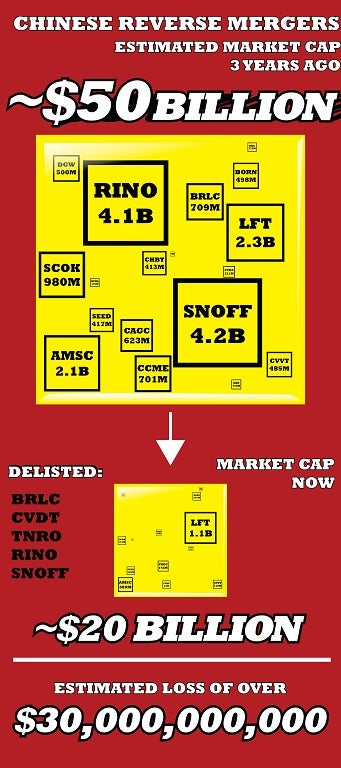Examining Chinese Reverse-Mergers: Market Cap Then and Now [INFOGRAPHIC]
It seems as though Chinese stock frauds have dominated the news in recent weeks.
Even CNBC viewers are aware of the collapse of such companies as Sino Forest, RINO, and China Media Express. After scathing reports and fraud allegations by research firms like Muddy Waters, these companies have seen their share prices plummet and market cap vanish.
Most infamously, the debacle over Sino Forest cost billionaire investor John Paulson roughly $500 million in a matter of days.
A reverse-merger Chinese stock is one wherein an existing company in China merges with a company in the United States in order to get exposure to U.S. markets. Reverse-mergers are often conducted to expedite the process of acquiring a public listing.
Investors who bought into these companies in the hopes of cashing in on the boom in the Chinese economy have experienced significant losses in recent weeks.
How bad have these losses been? Perhaps worse than investors believe. In fact, total losses may exceed $30 billion—roughly the GDP of the U.S. state of North Dakota.

Is the move a necessary correction or a buying opportunity?
Certainly, many of these stocks have been outright frauds. Sino Forest, after having a market cap valued at over $4 billion, is now no longer listed.
Yet, traders with high risk tolerance may consider taking a position in one of these companies. Despite the Chinese governments attempts to cool its economy, China might remain a major growth story going forward. Should any of these fraud charges prove to be overstated, investors might be looking at a once-in-a-lifetime investment opportunity.
Of course, perhaps these Chinese frauds are evidence of deep-seated problems within the Chinese economy itself.
Last week, according to Yahoo News, noted economist Nouriel Roubini (known for having predicted the collapse of the U.S. housing market) stated that he anticipated a "hard landing" for the Chinese economy. In that case, perhaps these Chinese frauds are foreshadowing a contraction in the broader Chinese economy.
At any rate, investors should act with caution when taking positions in reverse-merger Chinese stocks.
© 2025 Benzinga.com. Benzinga does not provide investment advice. All rights reserved.
Posted-In: Chinese Reverse-Merger John Paulson Muddy WatersAnalyst Color Short Sellers Global Economics Trading Ideas Best of Benzinga


